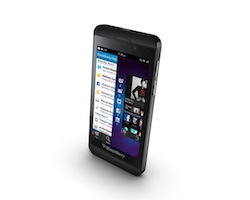BlackBerry has announced that its BB10 mobile OS will offer native support for Bluetooth Smart Ready, a key enabler of seamless connectivity between Bluetooth Smart devices, and could help drive consumer applications of M2M.
Bluetooth Smart Ready (formerly known as Bluetooth Low Energy) enables devices to communicate with each other using short data transfers with low power requirements to help preserve battery life in both smartphones and Bluetooth Smart devices.
Bluetooth 4.0 specification and GATT-based architecture will be integrated into the BB10 platform, which implements additional AES-CCM cryptography and privacy features to ensure that user data is kept safe while the smartphone is connecting to a Bluetooth Smart device.
Using the APIs in the Native Development Kit, application developers can now write BB10 apps that can work with Bluetooth smart devices currently on the market, from fitness to healthcare to automobiles.
On the possibility of this boosting consumer M2M applications, Yiru Zhong, Senior Industry Analyst, M2M & ICT in Smart Energy at Frost & Sullivan, said that while the idea that Bluetooth Smart could become the dominant protocol is “extremely attractive to the technology’s patent owners”, there are wider implications.
“First, it is the idea that the global pool of consumer smartphones could now become the addressable market on which M2M applications can be developed. This opens up the possibility of innovations in new M2M applications that have direct access to the end users; an eventual aim that every businesses aspire to achieve,” she said.
“Second, Bluetooth Smart might spark another round of interest around enabling sensor technologies that might go into the wellbeing vector of an M2M [device] in healthcare offering. This could be an important event that triggers a turning point for M2M in healthcare in Europe, where consumer wellbeing products become the main catalyst for M2M in healthcare revenues in the region. M2M telcos with a lead in healthcare or connected homes offering can extend their lead even more.”
Read more:
Future of Wireless: LTE M2M price-point must fall, says Vodafone



